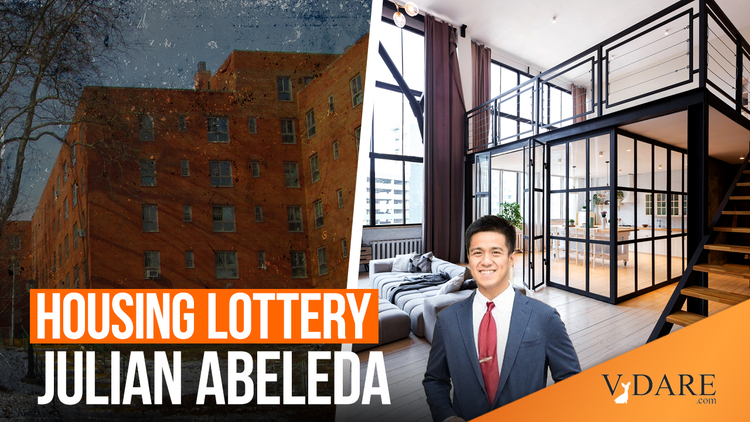
Housing Lotteries Get Safe Tenants, But Still Make No Sense
By Steve Sailer
01/21/2023
Earlier: The Political Economy of NYC “Affordable Housing”
I’m fascinated by affordable housing lotteries. For example, One South First is a 2019 luxury high-rise apartment building on the waterfront in the trendy Williamsburg neighborhood in Brooklyn. Evidently, to get permission to build, it promised that a little over one-fourth of its units would be subsidized for low- and middle-income tenants.
The New York Times runs an article about a Filipino-American white-collar worker from Sacramento who moves to New York for reasons Frank Sinatra sang about and gets a job at Price Waterhouse Coopers (PwC) and rents an apartment in Harlem. But his package deliveries keep getting stolen, so he wants to move some place nicer:
When Everything Goes Wrong, There’s Always New York
Julian Abeleda was optimistic when he left California, but he had a hard landing in Manhattan. A TikTok video about a housing lottery made him think, “Let’s just try.”
By D.W. Gibson
Jan. 16, 2023… He needed another place but doubted he’d be able to find anything better in his price range of $2,000 to $2,600. Then he saw a TikTok video alerting him to NYC Housing Connect, a city-run online portal for connecting low- and middle-income renters with affordable housing through open lotteries. According to The City, a review of 18 million applications between January 2014 and March 2019 revealed that for every unit designated for income-restricted lotteries, there were, on average, 314 eligible applicants.
“Everyone told me that a lottery would never work, it’d take years,” he said, “but I thought what do I have to lose? Let’s just try.”
Mr. Abeleda applied to the lottery in April 2022. Three months later he was notified that he’d been selected for a studio at One South First, a development in Williamsburg, Brooklyn, with just over a quarter of its units reserved for low- and middle-income- residents. He moved in on Sept. 16 of last year.
“Moving in was a breathtaking experience,” he said. “I saw the view on the balcony and immediately started texting my mom.”
So he wins a $3,996 per month studio apartment, for which he pays $2,490.
I used to think these New York lotteries were rigged because the people I read about winning them always seem like the kind of tenants that fancy apartment buildings wouldn’t mind: e.g., a chess-playing Asian data analyst at PwC who dresses like Bing Crosby is probably not going to deal tranq out of his apartment.
But I now think the lotteries are mostly honest, but persnickety: they have a lot of detailed rules about how the application must be filled out and mailed that give careful, rule-following white collar workers a better than even chance at winning.
Folks in NYC, don’t sleep on the lottery for new affordable housing units! Inspiring story. I’ve lived in NYC for 20 years and am hearing more of these stories regularly.
— Sheila Foster (@SheilaRFoster) January 17, 2023
I understand the logic of extracting something out of the real estate developer. Real estate developers impose externalities (e.g., a 450-foot building blocks the sun for neighbors). It’s so hard to get all the permits to build that those who do get them could make a fortune if they could rent the whole building at what the market would bear.
But, handing $18,000 per year to (literally) random individuals like this guy and nothing to everybody else seems sub-optimal. Has anybody proposed a better system?
